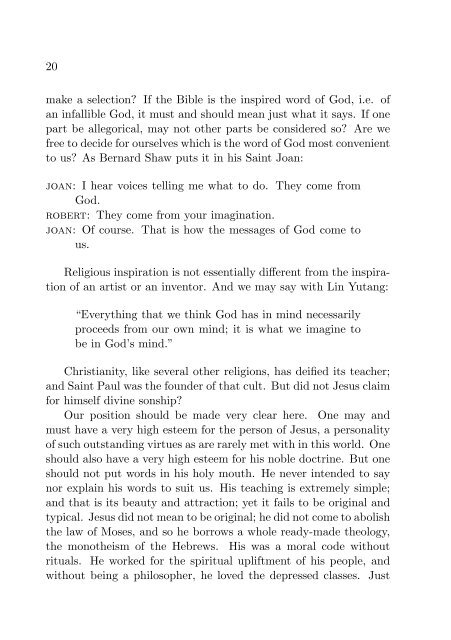Towards the Truth
Notes from a three-day debate in the 1940’s about Buddhism and Christianity.
Notes from a three-day debate in the 1940’s about Buddhism and Christianity.
You also want an ePaper? Increase the reach of your titles
YUMPU automatically turns print PDFs into web optimized ePapers that Google loves.
20<br />
make a selection? If <strong>the</strong> Bible is <strong>the</strong> inspired word of God, i.e. of<br />
an infallible God, it must and should mean just what it says. If one<br />
part be allegorical, may not o<strong>the</strong>r parts be considered so? Are we<br />
free to decide for ourselves which is <strong>the</strong> word of God most convenient<br />
to us? As Bernard Shaw puts it in his Saint Joan:<br />
joan: I hear voices telling me what to do. They come from<br />
God.<br />
robert: They come from your imagination.<br />
joan: Of course. That is how <strong>the</strong> messages of God come to<br />
us.<br />
Religious inspiration is not essentially different from <strong>the</strong> inspiration<br />
of an artist or an inventor. And we may say with Lin Yutang:<br />
“Everything that we think God has in mind necessarily<br />
proceeds from our own mind; it is what we imagine to<br />
be in God’s mind.”<br />
Christianity, like several o<strong>the</strong>r religions, has deified its teacher;<br />
and Saint Paul was <strong>the</strong> founder of that cult. But did not Jesus claim<br />
for himself divine sonship?<br />
Our position should be made very clear here. One may and<br />
must have a very high esteem for <strong>the</strong> person of Jesus, a personality<br />
of such outstanding virtues as are rarely met with in this world. One<br />
should also have a very high esteem for his noble doctrine. But one<br />
should not put words in his holy mouth. He never intended to say<br />
nor explain his words to suit us. His teaching is extremely simple;<br />
and that is its beauty and attraction; yet it fails to be original and<br />
typical. Jesus did not mean to be original; he did not come to abolish<br />
<strong>the</strong> law of Moses, and so he borrows a whole ready-made <strong>the</strong>ology,<br />
<strong>the</strong> mono<strong>the</strong>ism of <strong>the</strong> Hebrews. His was a moral code without<br />
rituals. He worked for <strong>the</strong> spiritual upliftment of his people, and<br />
without being a philosopher, he loved <strong>the</strong> depressed classes. Just
















